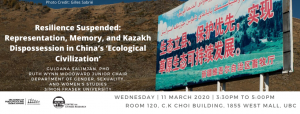
Wednesday, 11th March 2020
3:30pm to 5:00pm
Room 120, C.K Choi Building, 1855 West Mall, UBC
Abstract
Starting in 2009, the Chinese state launched the Settlement Project aiming to sedentarize pastoral nomadic communities such as Mongols, Kazakhs, Kyrgyz, and Tibetans as a measure to reduce grassland degradation. Behind such a massive social engineering project, there has been a constant asymmetrical struggle between the state and these ethnic minority communities for discursive control over ecology and the meaning of nomadism. This talk examines the representational politics surrounding ‘ecological civilization’ in China and how this new developmental metaphor has led to the dispossession of Indigenous groups as well as shrinking their cultural space. In response, these Indigenous groups practice active remembering of land-based knowledge via cultural production which demonstrates creative resilience. However, as physical landscapes have been drastically transformed in the name of ecological conservation and tourism, it becomes a question whether such cultural resilience is sustainable in the long run.
About the Speaker
Guldana Salimjan is the Ruth Wynn Woodward Junior Chair at Simon Fraser University’s Department of Gender, Sexuality, and Women Studies. Her research examines settler colonial processes in China and Central Eurasia, and how gender is positioned in the construction of historical memory, nationalism, and discourses of development.